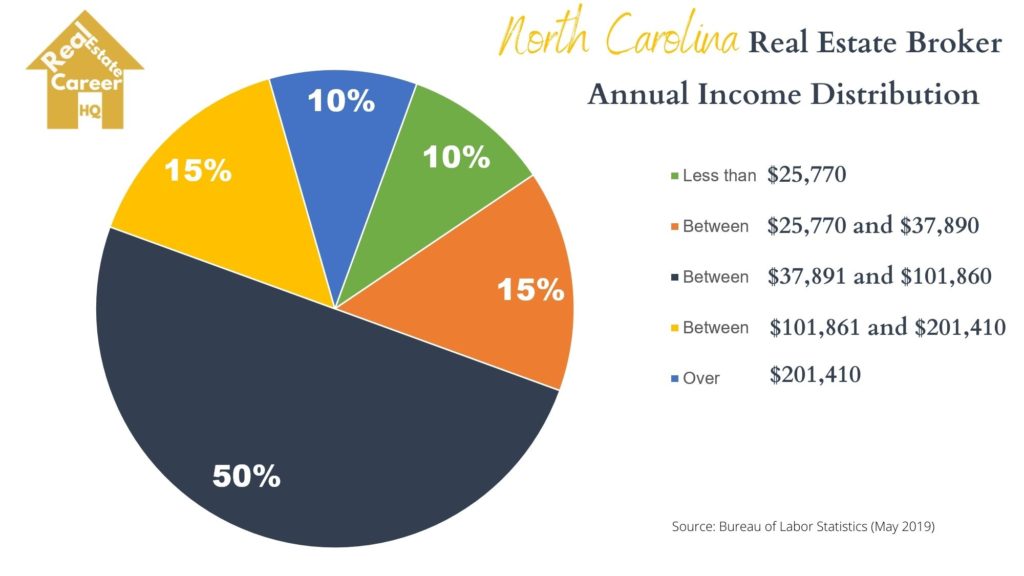(**) Disclosure: This post may contain affiliate links, meaning RealEstateCareerHQ.com will get a commission if you decide to make a purchase through the links, but at no additional cost to you.
Rather than making income solely based on your sales production, being a real estate “broker-in-charge” (BIC) in North Carolina allows you to build a team of sales agents. You’ll be recruiting, providing training and support to your underlying agents. In return, you would get a share of their commission.
To become a real estate broker in North Carolina, you must:
- Be at least 18 years old;
- Have at least 2 years of full time real estate sales experience or 4 years of part-time experience in the past 5 years;
- Complete 12 hours of Broker-in-Charge course from an approved education provider;
- Obtain the Broker-in-Charge designation
- Complete the CE and license renewal requirement
North Carolina Real Estate Commission is the regulatory body that protect consumers in matters relating to real property transactions. They are responsible for issuing the licenses and regulates the real estate industry.
In this guide, you’ll learn the steps to become a real estate broker-in-charge in North Carolina, income updates, and FAQs on this profession.
(If you are just starting the real estate career, but haven’t obtained the “provisional broker” license yet, you should read over this career starter guide first.)
But before we start, I want to give a brief disclaimer. This post is not intended as legal advice or state/federal real estate training. It is for general information only. Please always follow your State laws and best practices.
6 Steps to Become a Real Estate Broker-in-Charge in North Carolina

Step 1: Meet the eligibility requirement
You’ll need to be at least 18 years old, have a valid Social Security Number, high school graduate or the holder of a certificate of equivalency.
Step 2: Fulfill the work experience requirement
You need to have at least 2 years of full time real estate sales experience. Many real estate agents having been working on a part-time basis, if that you are one of them, then you’ll need at least 4 years of real estate sales experience in the past 5 years.
Step 3: Complete the pre-licensing education

You need to take 12 hours of Broker-in-Charge Course from an approved provider. The course will equip you with real estate knowledge such as brokerage start-up, trust accounts management, agency 101, non-agency relationships, property representation, advertising, training and supervision, ethics and negotiation, financing, risk managements and more.
Step 4: Obtain a BIC Eligible Status
To do so, you can fill out this form at the North Carolina Real Estate Commission website. In there, you would indicate whether you are applying as a sole proprietor, real estate firm, or branch office.
You will provide your name, contact info, license number and answers questions on criminal history or disciplinary actions if any.
Step 5: Maintain the broker-in-charge license
You are required to renew the North Carolina real estate license every year before June 30. It applies even if you just got your license in May or June.
You could renew it online at the NC Real Estate Commission website. The renewal fee is $45. You may pay with VISA, MasterCard, Discover, American Express or even Paypal.
To ensure you are keeping up to date with the new regulatory rules and best business practices, you need to complete the BICUP (Broker-in-Charge Update) course and one elective by June 10 each year.
Step 6: Familiarize with the BIC best practices
In addition to completing the CE courses, another excellent resource is the “Broker-in-Charge Best Practice Guide.” This is a 21 pages guide that covers most of the common questions of being a BIC. It consists of 6 sections:
- Section 1: Definitions
- Section 2: Written Office Policies
- Section 3: Records Management
- Section 4: Trust Accounts
- Section 5: Crisis Management – Dispute Resolution
- Section 6: Additional Information/ Resources
How long does it take to become a real estate broker-in-charge in North Carolina?
It takes at least 2 years to get a real estate broker-in-charge license in North Carolina. That is the required amount of real estate sales experience. But it also depends on the time it takes you to complete the pre-license courses, exam, background check, application.
You may speed up in getting the BIC license by taking online courses. This way, you’ll have the flexibility to finish the pre-licensing education at a quicker pace.
How Much do Real Estate Brokers Make in North Carolina?

Real estate brokers in North Carolina make an average of $85,100/year. It typically ranges between $37,890 to $101,860. Top earning real estate brokers are making over $201,410. (*)
Your earning depends on many factors. For example, the amount of time per week you are dedicated to run the business and the number of agents in your sales team. Having the skills and vision to delegate tasks to others rather than DIY is another major determining factor.
(*) Source: Bureau of Labor Statistics (May 2019)
Here’s another post you could be interested. “Do Brokers Make More than Real Estate Agents? (Facts Revealed)”
Whom can I contact if I have more questions about the real estate license in North Carolina?
You could use the online form to contact the NC Real Estate Commission
(**) Affiliate Disclosure: Please note that some of the links above are affiliate links, and at no additional cost to you. Our company, JCHQ Publishing will earn a commission if you decide to make a purchase after clicking on the link. Please understand that we include them based on our experience or the research on these companies or products, and we recommend them because they are helpful and useful, not because of the small commissions we make if you decide to buy something through the links. Please do not spend any money on these products unless you feel you need them or that they will help you achieve your goals.
Disclaimer: The information in this post is for general information only, and not intend to provide any advice. They are subjected to change without any notice, and not guaranteed to be error-free. Some of the posts on this site may contain views and opinions from individual not related to JCHQ Publishing. They do not necessarily reflect our view or position.
Reference:

